|
Experience it All in East Tennessee
Article by
Renee S. Gordon
"Country music is three chords and the truth."
Harlan Howard
Tennessee's tri-colored flag has a blue emblem in the center of
a field of red with three white stars. Each star represents one
of three geographic regions, the western lowlands, central
highlands and the mountainous east. Each region has a
distinctive history and culture and each has a unique story to
tell. The state's documented biography begins in East Tennessee
in an area that takes its name from the Appalachian Mountains.
Hernando de Soto named them in the 1540s after a northwestern
Florida tribe, the Apalachee.
For 10,000-years prior to European contact, Native Americans,
primarily the Cherokee, who called the territory "Sha-cona-ge,"
the "Land of the Blue Mist", settled the area.
The state name is a form of the Cherokee word "Tanasi," "little
river" or "meeting place." In 1673 scouts entered the region to
establish trade with the natives. A limited number of hardy
settlers filtered into the territory for the next century. In
the 1770s Daniel Boone established the Wilderness Trail as a
route
for settlers and extending the frontier beyond the mountains.
Bristol, Tennessee and Bristol, Virginia are considered twin
cities. The state line divides State Street and inlaid brass
discs denote which state you are in and allow you to stand in
two states at once. Each city has its own government but
basically is a single city.
www.bristoltn.org
In addition to the state line there is another iconic symbol.
The illuminated "Bristol Sign," lit by 1,300 bulbs, greets you
as you enter town. It was originally placed atop a hardware
store in 1910 and later relocated to the state line. The sign
proclaims the city "A Good Place to Live" and was listed on the
National Register of Historic Places (NRHP) in 1988.
The land on which the cities sit was surveyed in 1749 and in
1770 Isaac Baker and Evan Shelby erected a trading post in what
was then Sapling Grove. The land was sold to Reverend James King
who founded King's Meadow's. He sold a tract of land to Joseph
Anderson who founded the town of Bristol in 1852 and allowed his
daughter to name it. A friend, Samuel Goodson, founded
Goodsonville on the Virginia side of
the state line four years later. It
was renamed Bristol in 1890.
www.MyBristolVisit.com

A 20-ft. guitar is situated outside the Convention & Visitors
Bureau in tribute to Bristol's being deemed the "Birthplace of
Country Music," passed by resolution in 1998 by the US Congress.
The genesis of the designation began in July and August 1927
when Victor Talking Machine Company sent Ralph Peer to Bristol
to record "hillbilly music." Bristol was chosen because of its
proximity to Kentucky, North Carolina, Tennessee, Virginia and
West Virginia (TN is bordered by more states than any other
state.). Nineteen bands recorded 76 songs during the Bristol
Sessions including the Carter Family and Jimmie Rodgers. A
marker at
408 State St.
marks the location of the recordings in TN on the 2nd
and 3rd floors of the
Taylor-Christian Hat Company
----------
A second session was held for 8 days in October and November of
the following year. A number of the original artists returned,
joined by Harry Gay and Steve Tarter, African American blues
guitarists and singers. Gay and Tarter were pioneers in the
recording of "race records." The second sessions took place on 6th
St. and are
also indicated with a historic marker. Additional markers honor
the contributions of early artists and Ralph Peer.
www.bristolsessions.com
Tim White painted a large music mural honoring the 1927 sessions
in 1987. A stage located in front of the mural is the setting
for free concerts May to October and the best regional pickers
often perform here. While you are there look around for Rosetta
Bachelor's gold. Legend has it that she buried the family
fortune nearby upon the death of her husband and no one has ever
found it.
Visitors can follow a 13 stop self-guided walking tour that
encompasses sites associated with the city's history and its
residents. Confederate Calvary Colonel John Mosby, "The Gray
Ghost," was a lawyer in Bristol when the Civil War broke out and
is memorialized with a marker. His exploits were so audacious
that at one point, upon riding near Washington, DC, he sent
Lincoln a lock of his hair. It is said that Lincoln appreciated
the joke.
State Street is filled with shops, restaurants and music venues
and no visit is complete without a visit to at least two of
each. 620 State is the
perfect establishment in which to combine fine dining and live
music. The restaurant serves everything from sushi to southern
fried chicken and features musicians on a regular schedule.
www.620state.com. If you
get lucky you might stop in on a night when Amythyst Kiah, an
African American artist, whose playing and renditions of
original compositions, bluegrass and old time music are
stunning.
www.reverbnation.com/rpk/1309412
Hank Williams died on December 30, 1952 at the age of 29, his
legacy as a seminal figure in country music solidified. He was
taught to play the guitar and given performance pointers by
Ralph "Tee-Tot" Payne, a black street musician. Due to bad
weather he was being driven to his next concert and as he
arrived in Bristol the driver stopped at an all night
restaurant, the Burger Bar, and asked if Hank were hungry. He
replied that he was not and that was the last time he was seen
alive. The historic Burger Bar is still serving food made from
scratch using local and seasonal products and authentic,
historic, recipes. It is small and you may have to wait to be
seated but it is worth the wait.
www.burgerbarbristol.com

A few miles out of Bristol, but a definite must visit, is the
100-year old
Bellamy Hardware Store. This is the place to hear bluegrass
music up close and personal. The hardware store now sells
antiques and an adjacent building is equipped with a stage and
seating. The
experience is genuine and is one of being a guest in someone's
home and being entertained by old friends.
www.bluegrassatbellamy.com
The state-of-the-art Birthplace of Country Music Museum is
scheduled to open in August 2014. The 2-level museum will
interpret the entire history of the music from its roots in
Europe, the fields, churches and front porches to its modern
incarnations. An area will be devoted to race music and its
significance.
While in the Bristol area you are at the intersection of several
scenic trails. Thunder Road is arguably the most famous. It
gained fame during prohibition when moonshiners transported
untaxed alcohol from stills in the hills. The cars were fast,
the roads circuitous and during their free time the drivers
raced each other. These activities are credited with being the
start of NASCAR. In 2001 a NASCAR Mural was painted to honor
Dale Earnhardt and Richard Petty.
www.tntrailsandbyways.com
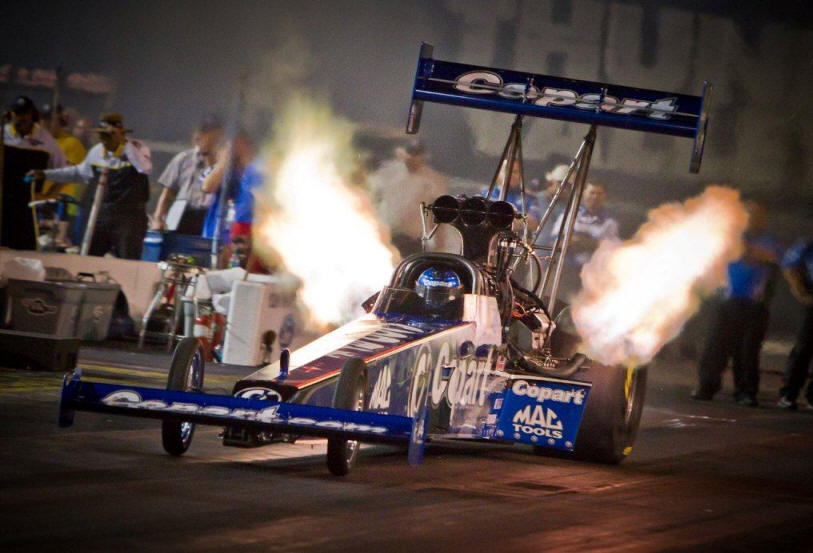
NASCAR Races are held only twice annually but drag races are
regularly scheduled and on Thursdays and Saturdays "Street
Fights" are held in which an individual races whoever pulls up
next to them. Tours of the track are offered and a trip to the
Bristol Motor Speedway, "The World's Fastest Half-Mile," is one
of the "10 Events to See Before You Die." The half-mile track is
60-ft. wide with a pit size of 16-ft. by 27-ft. Cars travel at
128-mph on the straightaway, 90-mph on the turns and a lap is
completed in 15 seconds. The speed record is 333-mph in
4-seconds.
The annual Speedway in Lights will be held
November 15 - January 4, 2014. This awesome event includes a
4-mile route adorned with 2-million lights, 12 Xmas scenes, food
and craft vendors and an ice skating rink. Guests can drive
their personal vehicles around the track to view the lights and
the gigantic tree.
Proceeds are donated to children's charities.
www.bristolmotorspeedway.com
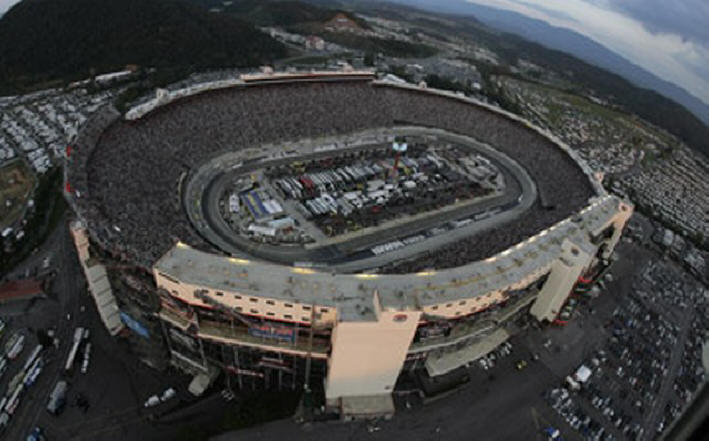
Stickley Farm Maze and Zipline is an entertainment complex that
was a dairy farm until the 1990s. Today it has one of the
country's largest corn mazes on 11-acres with 5-miles of trails.
The newest attraction, a 1080-ft. zipline that travels 30-mph
has been added to the pony rides, trampoline and other
activities. www.thestickleyfarm.com
Bays Mountain Park and Planetarium in Kingsport, opened in 1971,
is situated on 3,550-acres and is a nature preserve. The park
offers 38-miles of trails, a 44-acre lake, Steadman Heritage
Farmstead Museum, Nature Center, 152-seat planetarium and an
Adventure Course with a 300-ft. zipline. Wolves left this area
more than 200-years ago but at Bay's Mountain's Native Habitat a
pack of gray wolves are showcased and you can have a wolf
howling experience.
www.baysmountain.com
Kingsport's
Exchange Place, a living history museum, was listed on the NRHP
in 1978. Exchange Place, the Preston Farm, uses 6 original and 2
restored structures to interpret life on a self-sustaining farm
in the 1850s. The farm is located on the Old Stage Road, the
oldest road in the state. In the 1820s the complex served as a
relay station where the stagecoach driver could exchange horses
and patrons could exchange currency. It was necessary to
exchange currency because in that era there was no common legal
tender. The family owned several slaves but the cook's cabin was
the sole slave cabin on the farm. An interesting side note is
that it is on this land in 1775 that Daniel Boone killed a bear
and carved evidence of the event on a tree. Costumed
interpreters perform craft demonstrations.
www.exchangeplace.org
William and Barsheba Cobb moved into the wilderness of the
Appalachian valley at the forks of 2 rivers around 1770 and over
a 2-year period constructed a 2-story log house.
At that time TN was part of North Carolina. In May 1790
Congress created the Territory of the United States South-West
of the River Ohio and named William Blount the governor. Blount
moved in with the Cobbs and ran the government from there from
1790-92 making it the first territorial capitol.
Rocky Mount Living History Museum interprets the lifestyle of
Blount and the Cobbs in the latter 1700s. Authentically clad
docents portray friends, family, servants and slaves that
actually lived there at the time. Tours begin with a 10-minute
orientation film that provides family and historic background.
Some of the items belonged to the family and objects not to be
missed are the wig curling iron, swiveling cradle and traveling
medicine chest.

A territorial census was taken in 1791 and of the 35,691
people, 3,417 were enslaved. The Cobb's cook was a slave and the
interpreter does an outstanding job of explaining what her job
entailed. The kitchen, a separate building, is fully equipped
and there is a garden. www.rockymountmuseum.com
The most historic luxury hotel in the region is the 1890s
Carnegie Hotel in Johnson City. The full-service, 6-level, hotel
has 139 oversized rooms, deluxe amenities, 24-hour fitness room
and Austin Springs, a full service day spa.
Wellington's, the on-site restaurant, features an antique bar
and gourmet dining. Specials are available online.
www.carnegiehotel.com
The area that is now Kingsport's Long Island of the Holston was
once a place where the Native Americans held their councils. The
4.5-mile long island was considered a sacred place and both the
Great Warrior' Path and the Great Trading Path crossed the land.
In the 1750s a few scattered cabins were erected to trade with
the Cherokee and in 1761 Fort Robinson was constructed at the
river junction but was soon abandoned. Daniel Boone and 30
axemen set out from here in 1775 to blaze the now famous
Wilderness Trail that allowed settlers to push further westward
from the first frontier. The following year Fort Patrick Henry
was established near the site of the previous fort. It is
believed that the first Independence Day celebration was held at
Patrick Henry and it was manned throughout the American
Revolution.
Jobs and opportunities created by river trade brought
settlers to the town. One of the most successful businessmen was
James King the owner of King's Mill Station. In the late 1700s
the town was referred to as King's Port, later Kingsport.
Tennessee (TN) took ownership of Kingsport in 1802 after having
been claimed earlier by North Carolina, Virginia and the State
of Franklin. www.visitkingsport.com
Downtown Kingsport is filled with more than 45 gift and
specialty stores, bakeries and restaurants and the largest
collection of antique stores in the Southeast Region. This is
the perfect place to purchase a memento or souvenir. Between
serious bouts of shopping you can take in the city's Sculpture
Walk VII. Sculptures are juried and ten works are selected for
display for a one-year period. Kingsport also showcases its
permanent collection of eight sculptures. Visitors can tour
using Guide By Cell for additional information on each work.
www.downtownkingsport.org
Kingsport's commitment to the community and the arts is evident
in the Kingsport Carousel Project. More than 100 residents are
building a menagerie-style carousel including carving and
painting 32 animals and 2 chariots. Rounding boards, with scenes
of the area prior to 1956, are created by local artists. Located
atop the ticket booth will be a carved flying pig, a reference
to the fact that early on the project was considered so fanciful
that someone said it would only happen when pigs fly.
www.engagekingsport.com
Riverfront Seafood
Company is situated on the shore of the Holston River and is a
regional favorite. The restaurant provides splendid views as you
dine on the freshest catches of the day.
www.riverfrontseafood.com
Morristown was always a popular crossroads because of its
location on the Buffalo Trail and the Big Road that linked TN
with Baltimore. The town was named in honor of Absalom Morris
one of its earliest nonindigenous settlers. Another of those
early settlers was John Crockett, father of Davy. The family
lived in Morristown during Davy's childhood and legend has it
that he learned to shoot on what is now known as Crockett Ridge.
Crockett Tavern Museum has been interpreting the pioneer culture
of the 1700s since opening in 1958. A reproduction of the
family's cabin is situated near the site of the original family
tavern.
www.crocketttavernmuseum.org
Mountain Makins Festival has been voted both the "Best Festival
in East TN" and "One Of the Top 20 Events in the Southeast."
Morristown has been hosting this celebration of Appalachian
cultures since 1976. This is a crash course in the best of the
regional food, music, dance, craft and storytelling traditions.
More than 70-juried craftspeople showcase their art and
demonstrations of traditional skills are also on view.
www.morristowntn.com
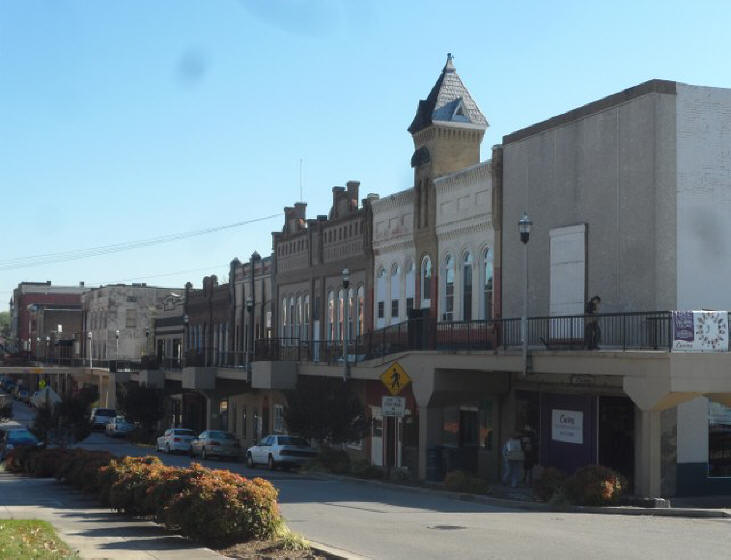
Downtown Morristown is a short walk from the festival venue and
it is totally unique. Twenty-five years ago the city added a
"SkyMart," a sidewalk at the buildings' second level. You can
stroll the main street along either the upper or sheltered lower
level. www.visitmorristown.com
There are no chain restaurants or shops downtown and there are
many choices for dining and shopping. You must stop in Jersey
Girl Diner. All of the choices are great and the diner has won
the People's Choice Award for " Best Lunch."
Cross the street to Yummy Cakes & More for dessert. The
desserts are handmade and delicious.
TN
Story Note: The
"Evil
Dead" was filmed in an unused cabin on the outskirts of
Morristown.
was filmed in an unused cabin on the outskirts of
Morristown.
Fourteen years before TN's statehood the town of Jonesborough
was founded and named in honor of Willie Jones a North Carolina
legislator. Jonesborough is the oldest city in the state and the
area is filled with meticulously maintained historic structures
and is a repository of the stories and legends of East TN.
It was the first TN town listed on the NRHP.
In order to ensure the continuation of the stories and the
storytelling traditions of Appalachia the National Storytelling
Festival was established in Jonesborough in 1973. The annual
festival has continued and is now the most highly regarded and
oldest storytelling event in the country. Jonesborough's
National Storytelling Center recently began collaboration with
the Desmond Tutu Peace Foundation to use the art of storytelling
to promote international peace. Individuals are invited to share
their stories.
www.tutufoundationusa.org and
www.storytellingcenter.net
A 21-year old Andrew Jackson practiced law in Jonesborough for
5-months in 1788 prior to moving to Nashville. He rented a cabin
from Christopher Taylor on the outskirts of town that was
reconstructed and relocated to Main Street in 1974. Not only is
the 2-story cabin the oldest building in the town, it is also
said to be haunted by Andrew Jackson.
Pennsylvanian Dr. William Chester constructed the first boarding
house in TN in 1797. Three U.S. presidents lodged in the
Italianate Chester Inn on the Great Stage Road. Today the inn is
home to the
National Story Telling Society.
Jonesborough had a slave population but it also had a
Philadelphia Quaker abolitionist named Elihu Embree. In 1819 he
began publication of the "Manumission
Intelligencier." One year later he started "The
Emancipator," the country's first newspaper dedicated
exclusively to ending slavery. After a mere 8 issues Embree
died. Ironically, Embree had been a slaveowner until 1812 when
he freed them. A historic marker denotes the site where the
paper was printed. www.historicjonesborough.com
Blair-Moore House
is
an exceptional Greek Revival-style, 2-story brick, home
constructed in 1832. In 1997, after a 5-year restoration by Jack
and Tami Moore, the house opened as a B&B. This home is filled
with antiques and modern amenities, has been featured in
"Southern Living" and is listed on the NRHP. A stay here is an
exceptional experience.
www.blairmoorehouse.com
Henry Johnson founded Johnson City in 1856 by constructing his
home at the site of a branch of the railroad. He went on to
establish an inn, post office, store and railroad depot.
Originally the town was known as Johnson's Depot but in 1869 it
was incorporated as Johnson City.
Story Note: Al Capone
is known to have hidden out here during prohibition.
www.visitjohnsoncitytn.com
The Reece Museum is located on the campus of East TN State
University and takes as its mission the preservation and
presentation of Appalachian culture. The museum's only permanent
exhibit relates the story of regional music beginning with the
ballads settlers brought with them. Kiosks allow you to access
46 hours of video. On view until January 4, 2014 is the
Smithsonian's traveling exhibit, "IndiVisible: African-Native
American Lives in the Americas."
www.etsu.edu/cass/reece
The Tipton-Haynes State Historic Site is, arguably, one of the
most important and representative sites in East TN. Tipton-Hayes
history stretches back at least 10,500-years and archeologists
have proven that a trace ran across the property indicating that
prehistoric animals and native hunters occupied the area. Col.
John Tipton purchased 100-acres in 1783 and constructed a 25' X
30' cabin. In 1831 his son inherited the property and in 1837 it
was sold to David Haynes who gifted the land to his son in the
1850s. Landon Haynes made additions to the house and added a
Greek revival portico. There are 18 locations, including a
museum and education center, and an orientation video on the
tour.
Oral tradition states that George Haynes, a slave of David
Haynes, was actually his son and half-brother of Langdon.
George's story and that of 2 additional Haynes slaves is fully
interpreted. Records show that in 1853 George was used as
collateral for Langdon's loans and during the Civil War he
continued working on the property when the family relocated to
Virginia. The family was forced to move because of the region's
Unionist sentiments. Modern Haynes family reunions include both
the white and black members.
www.tipton-haynes.org
From December 22, 1863 until January 28, 1864 General Longstreet
was headquartered in the Nenny House in Russellville. The area
was chosen because food was available and the house was selected
because it provided easy access to the railroad station and
telegraph lines. The first portion of the 1.5-story house had
2-rooms and dates from the 1820s. Nenny purchased the land and
moved the cabin here in 1834. Four rooms were added 20-years
later. A highlight of the headquarters tour is the Civil War
communications center complete with period telegraph and audio.
Longstreet's Garden on the exterior features medicinal and
culinary herbs as well as Civil War heirloom vegetables.
www.longstreetmuseum.com
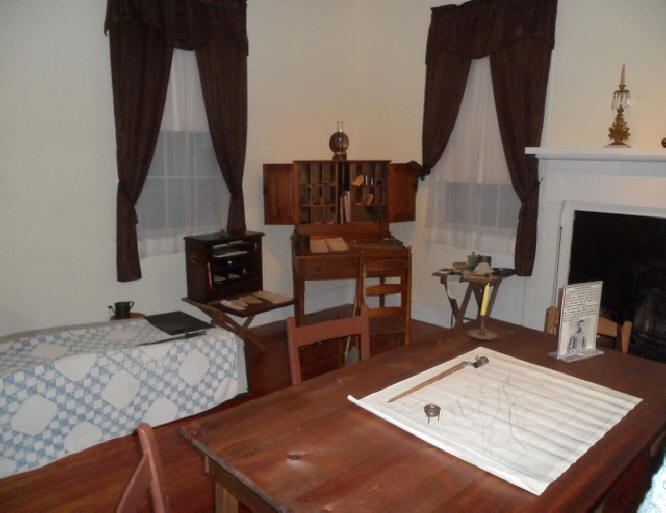
Greenville's Dickson-Williams Mansion typifies the southern
experience in the 1860s. It was truly a house divided with
brother pitted against brother and during the Civil War
Catherine Williams refused to divulge which side she was on
because two sons were Confederates and one was Union.
www.mainstreetgreeneville.org
The Federal mansion was constructed in 1815 using skilled Irish
and enslaved labor and was considered the "Showplace of East
TN." Guests were always welcome here and a list includes Henry
Clay, Davy Crockett, Andrew Jackson and Lafayette. John Hunt
Morgan, "The Thunderbolt of the Confederacy," was discovered to
be staying in the mansion on September 4, 1864 by Federal
soldiers and was killed while attempting to escape.
Tours of the house are outstanding. Furnishings are family
heirlooms or pieces from the 1850s to 1870s. Raphael Peale
portraits, artwork owned by R. E. Lee and books printed prior to
1872 are displayed and all of the mansion's clocks are still
working. The home has a number of breathtaking items handcrafted
by the Burgner Brothers, the most flamboyant being a kitchen
cabinet. Upstairs the tour includes the bedroom in which Morgan
spent the night. It is laid out as if he just walked into the
corridor. After his death the body was brought back to the house
and laid out in the parlor.
www.visitgreenvilletn.com
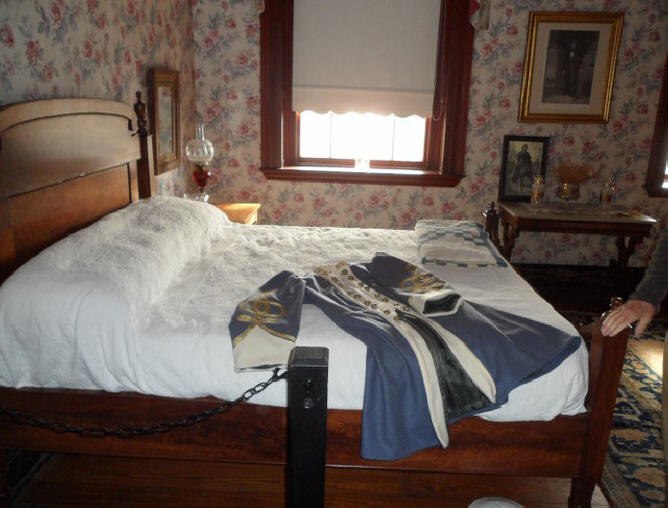
TN
Story Note: The
Melungeons are an East TN ethnic group with untraced origins. It
is believed that they are a blend of Native American,
Sub-Saharan African, Portuguese and possibly Viking ancestry
that precedes the first documented settlements in the New World.
With the encroachment of Europeans they moved into the
Appalachian region. Their largest community is located in and
around Sneedville and their most (in)famous person is Mahala
Mullins. Mahala was a moonshining 500-lb widow with 18 children.
When lawmen came to arrest her she put up no resistance but it
was impossible to get her out of her cabin or transport her down
the mountain. A deputy stated that Mahala was "catchable but not
fetchable." Mahala's 2-story dogtrot cabin is on display in the
Vardy Historic District. www.melungeons.com
are an East TN ethnic group with untraced origins. It
is believed that they are a blend of Native American,
Sub-Saharan African, Portuguese and possibly Viking ancestry
that precedes the first documented settlements in the New World.
With the encroachment of Europeans they moved into the
Appalachian region. Their largest community is located in and
around Sneedville and their most (in)famous person is Mahala
Mullins. Mahala was a moonshining 500-lb widow with 18 children.
When lawmen came to arrest her she put up no resistance but it
was impossible to get her out of her cabin or transport her down
the mountain. A deputy stated that Mahala was "catchable but not
fetchable." Mahala's 2-story dogtrot cabin is on display in the
Vardy Historic District. www.melungeons.com
Tennessee Is filled with outdoor recreational opportunities,
historic sites, eclectic dining venues, entertainment spots and
stories, lots of stories. Plan a visit and hear them for
yourself.
www.tnvacation.com
Photo credits:
Chamber Guitar-Malcolm J. Wilson
Bristol Motor Speedway-Bristol Motor Speedway
Hank Williams and band - Lum York
|